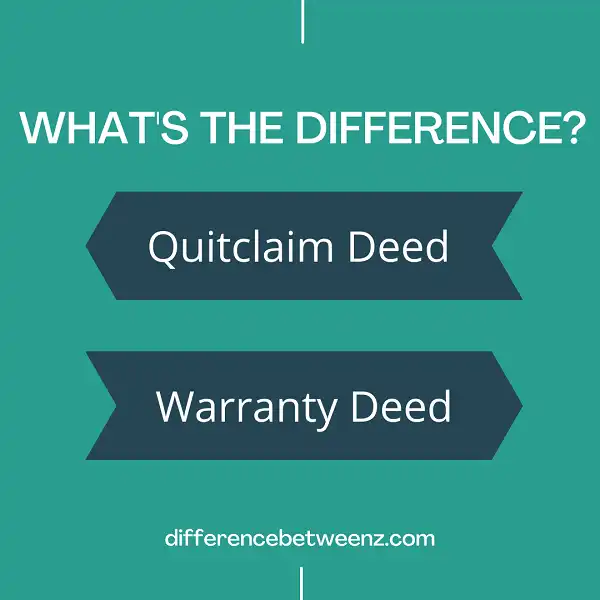When you’re buying or selling a house, it’s important to know the difference between a quitclaim deed and a warranty deed. Here’s a breakdown of each one, so you can understand what’s involved in each transaction.
What is Quitclaim Deed?
A quitclaim deed is a legal document that is used to transfer ownership of real property from one person to another. The person who signs the quitclaim deed, known as the grantor, gives up all claims to the property. This means that the grantor does not guarantee that he or she actually owns the property or that there are no outstanding liens against it. The recipient of the quitclaim deed, known as the grantee, takes ownership of the property subject to any outstanding claims against it.
Quitclaim deeds are often used when family members transfer property to one another or when people divorce and divide up their assets. They can also be used to correct errors in previous deeds or to remove someone’s name from a deed. Because quitclaim deeds are often used in situations where there is some uncertainty about ownership of the property, they are typically notarized to ensure their validity.
What is Warranty Deed?
A warranty deed is a type of deed in which the grantor (seller) guarantees that he or she holds a clear title to the property and has the right to convey it. The grantee (buyer) is protected against any claims or encumbrances on the property that were not disclosed by the grantor. In order to be valid, a warranty deed must be properly executed and delivered, and it must be accepted by the grantee.
Most warranty deeds contain additional language that provides even greater protection for the grantee, such as a covenant of quiet enjoyment, which promises that the grantor will not disturb the grantee’s possession of the property. Warranty deeds are often used in residential real estate transactions, as they provide significant peace of mind for buyers.
Difference between Quitclaim Deed and Warranty Deed
A quitclaim deed and a warranty deed are both types of documents used in real estate transactions. However, there are some key differences between the two.
- A quitclaim deed simply transfers ownership of the property from one person to another with no guarantee that the property is free of liens or other claims.
- In contrast, a warranty deed comes with certain guarantees from the seller. For example, the seller may guarantee that they have clear title to the property and that there are no outstanding liens or encumbrances.
As a result, a warranty deed provides more protection for the buyer than a quitclaim deed. When choosing between the two, it is important to consider your needs and the level of protection you are seeking.
Conclusion
So, what is the difference between a quitclaim deed and a warranty deed? In short, a quitclaim deed transfers any interest the grantor may have in the property to the recipient, while a warranty deed guarantees that the grantor has good title to the property and will defend it against any claims. When deciding which type of deed to use in your transaction, it’s important to understand the implications of each one. If you have any questions about whether or not a quitclaim or warranty deed is right for you, please don’t hesitate to contact us. We would be happy to help you navigate these complicated legal waters and ensure that your property transaction goes as smoothly as possible.


